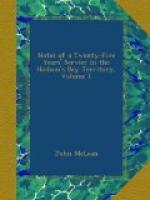Circumstances taken into consideration, I think it very unfair to draw comparisons between the social condition of young America, just become a distinct nation, and of old England, whose empire has lasted a thousand years. The American people are still too much occupied with the necessaries of life to devote much of their time to its elegancies; they are still engaged in the pursuits that ultimately ensure wealth and real independence. Those results attained, what is there to prevent the American gentleman from becoming as polished and accomplished as his cousin in Britain? Can it be supposed, with the least shadow of reason, that the short period that has elapsed since the Revolution can have been sufficient to produce that alteration in the character and manners of the Americans, which our travellers love to exercise their wit upon? It is impossible. The Americans “guessed,” and “calculated,” and “speculated,” while they were British subjects, just as they do now; nor have they learned to chew, and spit, and smoke tobacco since the 4th of July, 1782.
As to the peculiar phrases the Americans use in conversation, I am convinced that their forefathers brought the greater part of them from Britain, as many of those phrases are to be found in the works of old English authors still extant. The English language as spoken in America, is elegance itself, compared to the provincial dialects of Britain, or even to the vile slang one hears in the streets of London. This is a fact that every unprejudiced person who has travelled in America must admit.
It appears Americans find leisure, of late years, to travel and take notes, as well as their transatlantic brethren; and, in return for the polite attentions of our travellers, describe England and Englishmen in the bitter language of recrimination and retort; and thus the enmity between the mother and daughter is kept alive and perpetuated. A publication of this kind fell lately into my hands, entitled, “The Glory and Shame of England.” The writer, said to be a Christian minister, with the malignity of baser minds, sinks and keeps in the background her “glories,” and brings into relief and dwells upon her shameful parts; representing in the most sombre colours the misery of the “squalid” population of our cities. Would to God there were not so much truth in the picture! His reverence, however, seems to have lost sight of the clergyman; and in gratifying his resentment against England, and in his zeal to kindle the same unchristian feeling in the breasts of his countrymen, has not hesitated to sacrifice the truth;—and he a clergyman, whose office it is to “proclaim peace on earth, and good-will to men!”
That there is much misery and wretchedness in England, none can deny; but will not the well-informed philanthropist consider it rather as our misfortune than our reproach?—consisting mainly, as that mass of wretchedness does, of those ills which neither “kings nor laws can cause or cure.” What plan would this philanthropic divine recommend to remove those evils, which, while he affects to deplore, he yet glories over? Strip the nobility and land-owners of their possessions—convert our monarchy into a republic—and the church into a “meetin ouse?”




